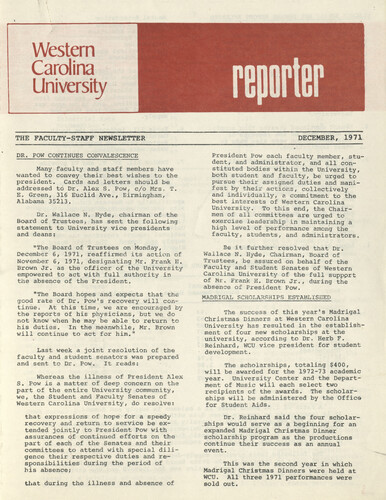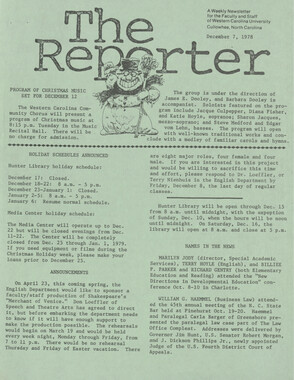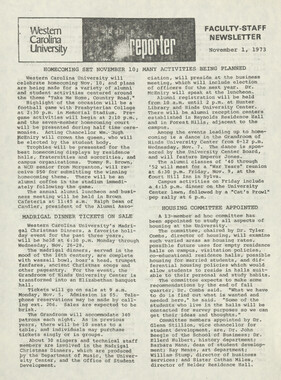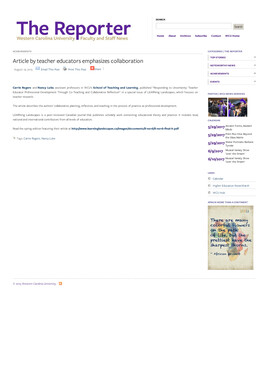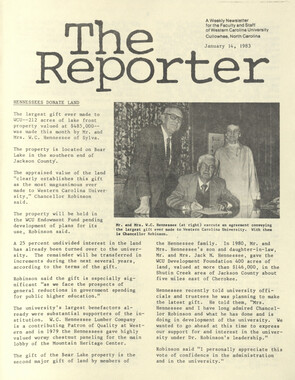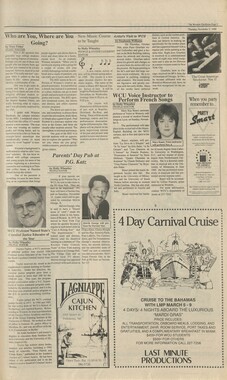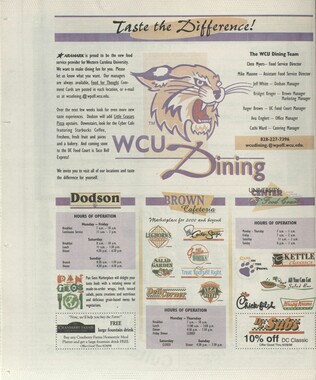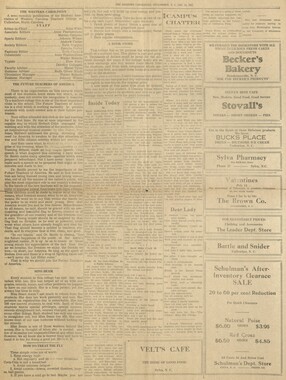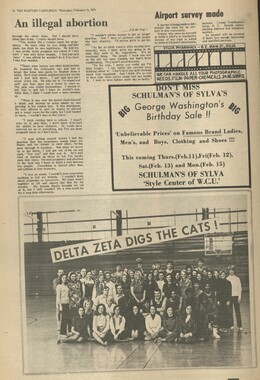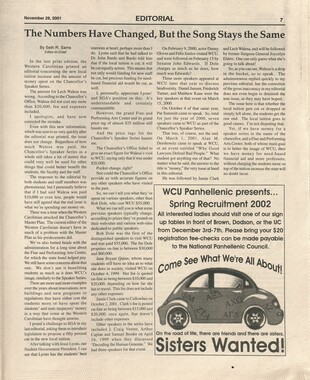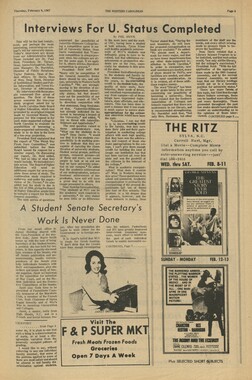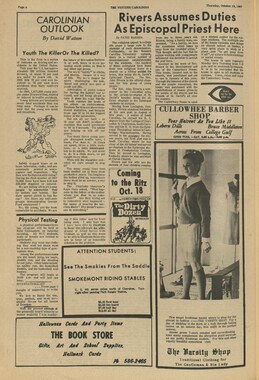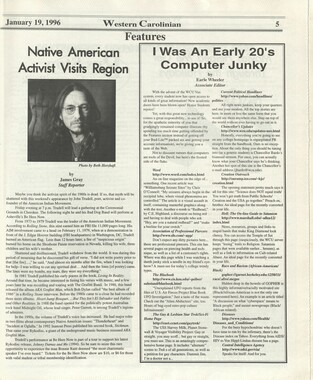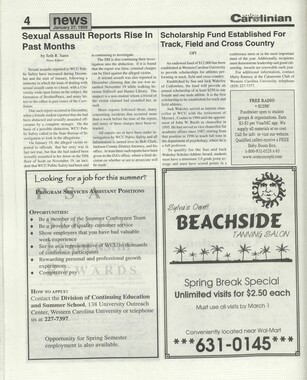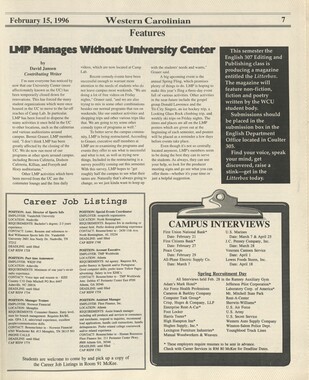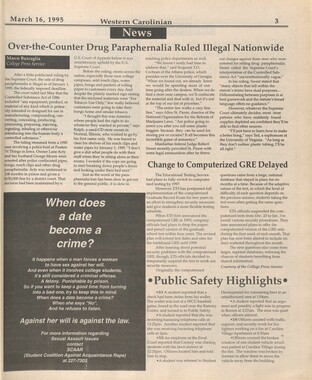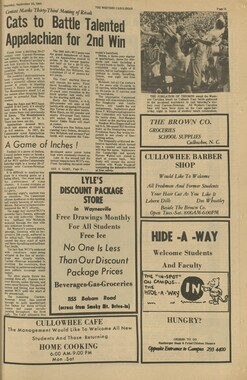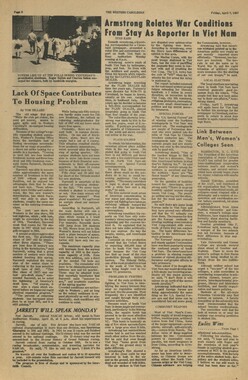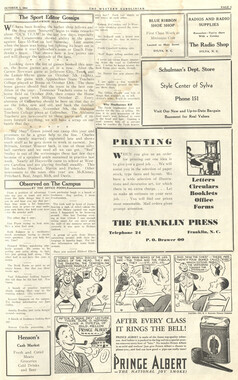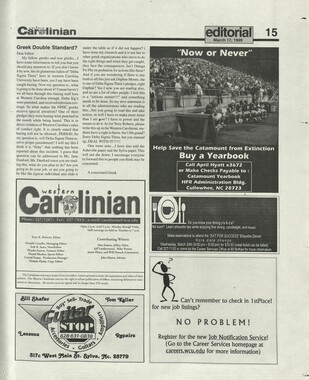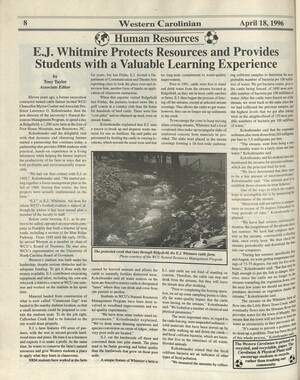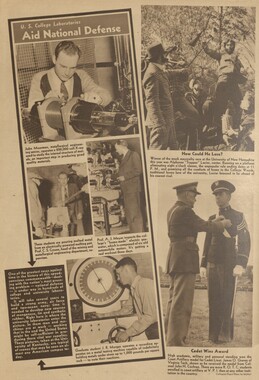Western Carolina University (1)
View all
- Western Carolina University Publications (781)
- Canton Champion Fibre Company (0)
- Cherokee Traditions (0)
- Civil War in Southern Appalachia (0)
- Craft Revival (0)
- Great Smoky Mountains - A Park for America (0)
- Highlights from Western Carolina University (0)
- Horace Kephart (0)
- Journeys Through Jackson (0)
- LGBTQIA+ Archive of Jackson County (0)
- Oral Histories of Western North Carolina (0)
- Picturing Appalachia (0)
- Stories of Mountain Folk (0)
- Travel Western North Carolina (0)
- Western Carolina University Fine Art Museum Vitreograph Collection (0)
- Western Carolina University Herbarium (0)
- Western Carolina University: Making Memories (0)
- Western Carolina University Restricted Electronic Theses and Dissertations (0)
- Western North Carolina Regional Maps (0)
- World War II in Southern Appalachia (0)
University of North Carolina Asheville (0)
View all
- Faces of Asheville (0)
- Forestry in Western North Carolina (0)
- Grove Park Inn Photograph Collection (0)
- Isaiah Rice Photograph Collection (0)
- Morse Family Chimney Rock Park Collection (0)
- Picturing Asheville and Western North Carolina (0)
- Western Carolina University (781)
- Allanstand Cottage Industries (0)
- Appalachian National Park Association (0)
- Bennett, Kelly, 1890-1974 (0)
- Berry, Walter (0)
- Brasstown Carvers (0)
- Cain, Doreyl Ammons (0)
- Carver, George Washington, 1864?-1943 (0)
- Cathey, Joseph, 1803-1874 (0)
- Champion Fibre Company (0)
- Champion Paper and Fibre Company (0)
- Cherokee Indian Fair Association (0)
- Cherokee Language Program (0)
- Crittenden, Lorraine (0)
- Crowe, Amanda (0)
- Edmonston, Thomas Benton, 1842-1907 (0)
- Ensley, A. L. (Abraham Lincoln), 1865-1948 (0)
- Fromer, Irving Rhodes, 1913-1994 (0)
- George Butz (BFS 1907) (0)
- Goodrich, Frances Louisa (0)
- Grant, George Alexander, 1891-1964 (0)
- Heard, Marian Gladys (0)
- Kephart, Calvin, 1883-1969 (0)
- Kephart, Horace, 1862-1931 (0)
- Kephart, Laura, 1862-1954 (0)
- Laney, Gideon Thomas, 1889-1976 (0)
- Masa, George, 1881-1933 (0)
- McElhinney, William Julian, 1896-1953 (0)
- Niggli, Josephina, 1910-1983 (0)
- North Carolina Park Commission (0)
- Osborne, Kezia Stradley (0)
- Owens, Samuel Robert, 1918-1995 (0)
- Penland Weavers and Potters (0)
- Rhodes, Judy (0)
- Roberts, Vivienne (0)
- Roth, Albert, 1890-1974 (0)
- Schenck, Carl Alwin, 1868-1955 (0)
- Sherrill's Photography Studio (0)
- Smith, Edward Clark (0)
- Southern Highland Handicraft Guild (0)
- Southern Highlanders, Inc. (0)
- Stalcup, Jesse Bryson (0)
- Stearns, I. K. (0)
- Thompson, James Edward, 1880-1976 (0)
- United States. Indian Arts and Crafts Board (0)
- USFS (0)
- Vance, Zebulon Baird, 1830-1894 (0)
- Weaver, Zebulon, 1872-1948 (0)
- Western Carolina College (0)
- Western Carolina Teachers College (0)
- Western Carolina University. Mountain Heritage Center (0)
- Whitman, Walt, 1819-1892 (0)
- Wilburn, Hiram Coleman, 1880-1967 (0)
- Williams, Isadora (0)
- 1970s (81)
- 1980s (119)
- 1990s (302)
- 2000s (195)
- 2010s (83)
- 1600s (0)
- 1700s (0)
- 1800s (0)
- 1810s (0)
- 1820s (0)
- 1830s (0)
- 1840s (0)
- 1850s (0)
- 1860s (0)
- 1870s (0)
- 1880s (0)
- 1890s (0)
- 1900s (0)
- 1910s (0)
- 1920s (0)
- 1930s (0)
- 1940s (0)
- 1950s (0)
- 1960s (0)
- 2020s (0)
- Jackson County (N.C.) (780)
- Appalachian Region, Southern (0)
- Asheville (N.C.) (0)
- Avery County (N.C.) (0)
- Blount County (Tenn.) (0)
- Buncombe County (N.C.) (0)
- Cherokee County (N.C.) (0)
- Clay County (N.C.) (0)
- Graham County (N.C.) (0)
- Great Smoky Mountains National Park (N.C. and Tenn.) (0)
- Haywood County (N.C.) (0)
- Henderson County (N.C.) (0)
- Knox County (Tenn.) (0)
- Knoxville (Tenn.) (0)
- Lake Santeetlah (N.C.) (0)
- Macon County (N.C.) (0)
- Madison County (N.C.) (0)
- McDowell County (N.C.) (0)
- Mitchell County (N.C.) (0)
- Polk County (N.C.) (0)
- Qualla Boundary (0)
- Rutherford County (N.C.) (0)
- Swain County (N.C.) (0)
- Transylvania County (N.C.) (0)
- Watauga County (N.C.) (0)
- Waynesville (N.C.) (0)
- Yancey County (N.C.) (0)
- Newsletters (510)
- Publications (documents) (271)
- Aerial Photographs (0)
- Aerial Views (0)
- Albums (books) (0)
- Articles (0)
- Artifacts (object Genre) (0)
- Biography (general Genre) (0)
- Cards (information Artifacts) (0)
- Clippings (information Artifacts) (0)
- Crafts (art Genres) (0)
- Depictions (visual Works) (0)
- Design Drawings (0)
- Drawings (visual Works) (0)
- Envelopes (0)
- Facsimiles (reproductions) (0)
- Fiction (general Genre) (0)
- Financial Records (0)
- Fliers (printed Matter) (0)
- Glass Plate Negatives (0)
- Guidebooks (0)
- Internegatives (0)
- Interviews (0)
- Land Surveys (0)
- Letters (correspondence) (0)
- Manuscripts (documents) (0)
- Maps (documents) (0)
- Memorandums (0)
- Minutes (administrative Records) (0)
- Negatives (photographs) (0)
- Newspapers (0)
- Occupation Currency (0)
- Paintings (visual Works) (0)
- Pen And Ink Drawings (0)
- Periodicals (0)
- Personal Narratives (0)
- Photographs (0)
- Plans (maps) (0)
- Poetry (0)
- Portraits (0)
- Postcards (0)
- Programs (documents) (0)
- Questionnaires (0)
- Scrapbooks (0)
- Sheet Music (0)
- Slides (photographs) (0)
- Sound Recordings (0)
- Specimens (0)
- Speeches (documents) (0)
- Text Messages (0)
- Tintypes (photographs) (0)
- Transcripts (0)
- Video Recordings (physical Artifacts) (0)
- Vitreographs (0)
- The Reporter, Western Carolina University (510)
- WCU Students Newspapers Collection (270)
- A.L. Ensley Collection (0)
- Appalachian Industrial School Records (0)
- Appalachian National Park Association Records (0)
- Axley-Meroney Collection (0)
- Bayard Wootten Photograph Collection (0)
- Bethel Rural Community Organization Collection (0)
- Blumer Collection (0)
- C.W. Slagle Collection (0)
- Canton Area Historical Museum (0)
- Carlos C. Campbell Collection (0)
- Cataloochee History Project (0)
- Cherokee Studies Collection (0)
- Daisy Dame Photograph Album (0)
- Daniel Boone VI Collection (0)
- Doris Ulmann Photograph Collection (0)
- Elizabeth H. Lasley Collection (0)
- Elizabeth Woolworth Szold Fleharty Collection (0)
- Frank Fry Collection (0)
- George Masa Collection (0)
- Gideon Laney Collection (0)
- Hazel Scarborough Collection (0)
- Hiram C. Wilburn Papers (0)
- Historic Photographs Collection (0)
- Horace Kephart Collection (0)
- Humbard Collection (0)
- Hunter and Weaver Families Collection (0)
- I. D. Blumenthal Collection (0)
- Isadora Williams Collection (0)
- Jesse Bryson Stalcup Collection (0)
- Jim Thompson Collection (0)
- John B. Battle Collection (0)
- John C. Campbell Folk School Records (0)
- John Parris Collection (0)
- Judaculla Rock project (0)
- Kelly Bennett Collection (0)
- Love Family Papers (0)
- Major Wiley Parris Civil War Letters (0)
- Map Collection (0)
- McFee-Misemer Civil War Letters (0)
- Mountain Heritage Center Collection (0)
- Norburn - Robertson - Thomson Families Collection (0)
- Pauline Hood Collection (0)
- Pre-Guild Collection (0)
- Qualla Arts and Crafts Mutual Collection (0)
- R.A. Romanes Collection (0)
- Rosser H. Taylor Collection (0)
- Samuel Robert Owens Collection (0)
- Sara Madison Collection (0)
- Sherrill Studio Photo Collection (0)
- Smoky Mountains Hiking Club Collection (0)
- Stories of Mountain Folk - Radio Programs (0)
- Venoy and Elizabeth Reed Collection (0)
- WCU Gender and Sexuality Oral History Project (0)
- WCU Mountain Heritage Center Oral Histories (0)
- WCU Oral History Collection - Mountain People, Mountain Lives (0)
- Western North Carolina Tomorrow Black Oral History Project (0)
- William Williams Stringfield Collection (0)
- Zebulon Weaver Collection (0)
- African Americans (390)
- Appalachian Trail (35)
- Artisans (521)
- Cherokee art (84)
- Cherokee artists -- North Carolina (10)
- Cherokee language (21)
- Cherokee pottery (101)
- Cherokee women (208)
- Church buildings (167)
- Civilian Conservation Corps (U.S.) (110)
- College student newspapers and periodicals (1830)
- Dams (103)
- Dance (1023)
- Education (222)
- Floods (61)
- Folk music (1015)
- Forced removal, 1813-1903 (2)
- Forest conservation (220)
- Forests and forestry (917)
- Gender nonconformity (4)
- Great Smoky Mountains National Park (N.C. and Tenn.) (154)
- Hunting (38)
- Landscape photography (10)
- Logging (103)
- Maps (84)
- Mines and mineral resources (8)
- North Carolina -- Maps (18)
- Paper industry (38)
- Postcards (255)
- Pottery (135)
- Railroad trains (71)
- Rural electrification -- North Carolina, Western (3)
- School integration -- Southern States (2)
- Segregation -- North Carolina, Western (5)
- Slavery (5)
- Sports (452)
- Storytelling (245)
- Waterfalls -- Great Smoky Mountains (N.C. and Tenn.) (66)
- Weaving -- Appalachian Region, Southern (280)
- Wood-carving -- Appalachian Region, Southern (328)
- World War, 1939-1945 (173)
- Text (781)
- MovingImage (0)
- Sound (0)
- StillImage (0)
The Reporter, December 1971
-
The Reporter is a publication produced by Western Carolina University featuring news, events, and campus community updates for faculty and staff. The publication began in August of 1970 and continues digitally today. Click on the link in the “Related Mate
-
-
Western Carolina University THE FACULTY-STAFF NEWSLETTER DR. PQW CONTINUES CONVALESCENCE Many faculty and staff members have wanted to convey their best wishes to the president. Cards and letters should be addressed to Dr. Alex S. Pow, c/o Mrs, T. E. Green, 316 Euclid Ave., Birmingham, Alabama 35213. Dr. Wallace N. Hyde, chairman of the Board of Trustees, has sent the following statement to University vice presidents and deans: "The Board of Trustees on Monday, December 6, 1971, reaffirmed its action of November 6, 1971, designating Mr. Frank H. Brown Jr. as the ofJEicer of the University empowered to act with full authority in the absence of the President. "The Board hopes and expects that the good rate of Dr. Pow's recovery will continue. At this time, we are encouraged by the reports of his physicians, but we, do not know when he may be able to return to his duties. In the meanwhile, Mr. Brown will continue to act for him." Last week a joint resolution of the faculty and student senators was prepared and sent to Dr. Pow. It reads: Whereas the illness of President Alex S. Pow is a matter of deep concern on the part of the entire University community, we, the Student and Faculty Senates of Western Carolina University, do resolve: that expressions of hope for a speedy recovery and return to service be extended jointly to President Pow with assurances of continued efforts on the part of each of the Senates and their committees to attend with special diligence their respective duties and re- DECEMBER, 1971 President Pow each faculty member, student, and administrator, and all constituted bodies within the University, both student and faculty, be urged to pursue their assigned duties and manifest by their actions, collectively and individually, a commitment to the best interests of Western Carolina University. To this end, the Chairmen of all committees are urged to exercise leadership in maintaining a high level of performance among the faculty, students, and administrators. Be it further resolved that Dr. Wallace N. Hyde, Chairman, Board of Trustees, be assured on behalf of the Faculty and Student Senates of Western Carolina University of the full suppprt of Mr. Frank H. Brown Jr., during the absence of President Pow. MADRIGAL SCHOLARSHIPS ESTABLISHED The success of this year's Madrigal Christmas Dinners at Western Carolina University has resulted in the establishment of four new scholarships at the university, according to Dr. Herb F. Reinhard, WCU vice president for student development. The scholarships, totaling $400, will be awarded for the 1972-73 academic year. University Center and the Department of Music will each select two recipients of the awards. The scholarships will be administered by the Office for Student Aids. Dr. Reinhard said the four scholarships would serve as a beginning for an expanded Madrigal Christmas Dinner scholarship program as the productions continue their success as an annual event. sponsibilities during the period of This was the second year in which his absence; Madrigal Christmas Dinners were held at WCU. All three 1971 performances were that during the illness and absence of sold out. TEACHER SUPPLY AND DEMAND REPORT RELEASED The 1970-71 Teacher Supply and Demand Report prepared by the Teacher Placement Office under the direction of Dr. Ben H. Battle was recently released. Dean Taft B. Botner of the School of Education and Psychology has made these comments in releasing the report: 1. The number of graduates qualifying for the North Carolina "A" Certificate was 376, representing 46% of all undergraduate degrees of the University. 2. Demand continued greater than supply. No doubt many of the requests of this institution were also made to other institutions. 3. The placement office reports all Western Carolina University teacher education graduates seeking teaching positions had opportunities for employment. There are always a small number of graduates who will not or cannot accept positions available. Some secondary education majors accepted middle grade level positions? however, secondary education certification covers grades 7-12. 4. Areas still in high demand are: Mental Retardation Speech and Hearing Industrial Education Physical Sciences Mathematics Girls Physical Education Library Science (Educational Media) 5. A study of the Supply and Demand Table, shows that only the numbers in Art, Home Economics, Boys Physical Education, and Social Studies exceeded the requests from North Carolina, and in no area was the total demand less than the supply. 6. Table III, indicates the North Carolina school systems in which Western Carolina University graduates were employed. 7. Tables III, IV, V, and VI provide interesting information relating to placement of Western Carolina University teacher graduates. A study of this report as it relates specifically to Western Carolina University teacher education graduates and placement will reveal that the situation presented in the Western Carolina University Report is not the same as national reports regarding teacher supply and demand. The State Board of Higher Education recently published a TEACHER SUPPLY-DEMAND RATIO 1965-1975 Year National Supply-Demand Ratio State Supply-Demand Ratio 1965-66 .94 1966-67 .92 1967-68 1.09 .88 1968-69 1.07 1.06 1969-70 1.13 1.20 1970-71 1.47 1.59 (Projected) 1971-72 1.74 1.70 1972-73 1.89 1.80 1973-74 1.93 1.90 1974-75 2.02 1.80 A ratio of 1.00 means there is a balance in supply and demand. It is interesting to compare these data with the supply-demand information in the Western Carolina University Report. (Note: No doubt requests coming to Western Carolina University also went to other institutions.) The supply-demand ratio for WCU for 1970-71 in terms of state requests was .55 and total requests, .20. The following table provides supply-demand ratios for the various teaching areas as reported by the State Board of Higher Education Report and the WCU Report. The national ratios are for 1969-70 and the state and WCU ratios are for 1970-71. 3 SUPPLY-DEMAND RATIOS FOR THE TEACHING AREAS Teaching Area National Ratio State Ratio WCU Supply- Demand Ratio* Elementary Ed. 1.14 .78 Business 3.38 .53 English 1.41 .38 Foreign Lang. 1.91 1.89 .43 Home Economics 1.26 3.00 4.75 Health & P. E. 1.36 3.49 .86 Art 1.02 1.79 1.25 Industrial Arts .80 1.37 .21 Mathematics .43 1.05 .18 Music 2.61 .71 Sciences .46 .97 .23 Library Science .39 1.11 .05 Social Science .90 3.27 2.61 Special Ed. .54 .36 *These ratios are based on supply representing requests from North Carolina schools only. Out-of-state requests were approximately twice the state requests. (See Table II, of the WCU Supply-Demand Report.) comprehensive report on teacher education and its outlook. The following data taken from the study show the ratio of supply to demand, national and state. It is quite obvious that some of the WCU ratios are unrealistic in terms of the general situation. This is due to the very small number of the WCU supply in some areas. (Examples: Foreign Languages - 10, Library Science- 1, Music - 5, Science - 9.) Some other data from the State Board of Higher Education Report are interesting when compared with WCU respective data. Public institutions of North Carolina awarded 15,087 total bachelor degrees in 1969-70, and of these, 4696, or 31%, were teacher education degrees. During this same year WCU awarded 731 degrees with 322, or 44%, in teacher education. In 1970- 71, WCU awarded 821 degrees with 370, or 46%, in teacher education. These percentages of graduates in teacher education compare with Appalachian State University (87%) and East Carolina University (69%) . Some Comments: 1. The reported over-supply of teachers is due to the decrease in school age children and the fact that college level ages are in the peak of the high birth rate dates. 2. Predicted increasing supply of teachers is based on the continued trend of a leveling of school age children and a continued increase in college enrollments. Recent emphasis on technical and occupational education may serve to change this trend. 3. Over the past 15 years only 64 to 74 percent of graduates who prepared to teach entered employment as teachers. The percent seems to fluctuate with the economic situation. In times of expanding economy a lower percent enter teaching. 4. Approximately 50% of secondary school teachers and 80% of elementary teachers are women. The percentage of women elementary teachers is even higher in North Carolina. 5. A high percentage of elementary education graduates (80%) take teaching employment? however, the drop-out to raise families and devote full time to homekeeping is as high as 50% within three to five years. 6. A low percentage of secondary education graduates in some subject areas take teaching employment. 7. With improved economic conditions, no doubt teacher-pupi] ratios will be reduced and greater allotments in areas of special education and kindergarten education will be made. The Southern Association of Colleges and Schools accreditation standards require a reduction of pupil-teacher ratio in the elementary school from 28 to 1 to 25 to 1 over a three year period. 4 As more elementary schools become accredited, the demand for elementary teachers will increase. Full implementation of the kindergarten education program in North Carolina will require more than 5500 additional early childhood education teachers and an overall reduction in pupil-teacher ratio would require additional thousands. 8. Steps should be taken to provide graduates with more than one area of specialty. Students and advisers should investigate the possibility of dual certification programs, looking especially to the areas of greatest demand. 9. Despite publicity of teacher surpluses , teaching probably still offers the greatest possibility of employment for large numbers of college graduates. Also, it is important to note that the teacher education graduate at the secondary education level has the same depth of preparation in a discipline as liberal arts graduates and for the most part are qualified for most positions that liberal arts graduates may enter. This is evidenced by the high percentage of secondary teacher education graduates taking positions outside teaching. (Over the past 15 years during a period of teacher shortage, 26% to 36% took positions other than teaching.) 10. Graduates in elementary education at WCU are approximately 90% women and the elementary education programs are excellent preparation for home-makers, mothers, and citizens as well as employment in the growing fields of child care and child development. 11. There continues to be a great demand for men in elementary education with an almost non-existent supply. 12. There will always be demand for quality teachers. The projected surplus should serve as a challenge to both the University and students. Programs of teacher education, students entering the programs, and the quality of instruction should assure a quality that will always be in demand. NEW TRUSTEE, BOARD OF GOVERNORS MEMBERS Dr. Wallace N. Hyde of Asheville and E. J. Whitmire of Franklin will take seats January 1, 1972, on the new higher education board of governors. They were elected at the December 6 meeting of the board of trustees, under provisions of the higher education restructuring act adopted by the adjourned session of the 1971 General Assembly in October. Robert L. Edwards of Mars Hill, superintendent of Madison County Public Schools, was greeted at the meeting as a new member of the Board of Trustees. Edwards wa£ appointed to an eight-year term on the board by Governor Robert W. Scott to succeed Modeal Walsh of Robbins-ville, whose term expired this year. WITH THE FACULTY PUBLICATIONS Max E. White, "Excavations at Evans Gap Site, Jackson County, N. C." Newsletter of the Southeastern Archaeological Conference, October, 1971. Dr. Nora Graves, The Two Culture Theory in C. P. Snow's Novels, University an3~College Press of Mississippi. Dr. Reuben Swanson, review of Gustaf Dalman's "Jesus-Jeshua; Studies in the Gospels," translated by P. P. Levertoff, Choice, October, 1971. Dr. Arnold M. Nielsen, "The 'New1 Industrial Arts," North Carolina Education Journal, November, 1971. MEETINGS Mr. and Mrs. Max E. White and Dr. John Dorwin attended the 28th annual meeting of the Southeastern Archaeoligical Conference, Macon, Ga., Nov. 12-13. Mr. White presented a paper, "Ecological Implications of the Evans Gap Site, Jackson County, N. C." Dr. William C. McGowan was co-author of a paper "1.5 to 12 MeV Alpha Particle Induced X-Ray Studies in Ho, Ph, Sb, Ti, and Zn" presented at the Division of Nuclear Physics, American Physical Society Meeting, Tucson, Ari., Nov. 4-6. The paper presented results of an experiment performed at a Summer Institute "Low Energy Accelerators for Teaching and Research," held at the Special Training Division, Oak Ridge National Laboratory. Professor Theodore Huguelet read a paper, "The Epic Tradition in Wordsworth's The Recluse," at the annual meeting of the South Atlantic Modern Language Association at Atlanta in Nov. Dr. Huguelet also Served as secretary and was elected Chairman of English II for 1972. Dr. R. M. Ainsley and Dr. James Wilson attended the annual meeting of the Southern Regional Council on Educational Administration in.Atlanta, Nov. 15-17. A major theme of the meeting was the improvement of preparation programs for school administrators. Miss Sue Fields, Dr. Helen Hartshorn, Miss Betty Peel, Dr. Otto H. Spilker, and Miss Betty Westmoreland attended the convention of the North Carolina Association for Health, Physical Education, and Recreation, Nov. 18-20 in Wilmington. Miss Westmoreland and Miss Peele were recognized at the business session by a resolution of appreciation for the excellence with which they co-chaired and conducted the 3rd National Women's Basketball Tournament. At the South Atlantic Modern Language Association meeting in Atlanta in November, Dr. Marcel Andrade presented a paper, "El religioso disoluto del Renacimiento visto por Gil Vincente." Gil Vincente, a playwright who wrofcfc in Portuguese, Spanish, and a combination of both, was a contemporary of Erasmus. His dramatic sketches of corrupt, worldly priests echoed the anticlerical, sentiment of the Portuguese kings whose powers were rivaled by the power of the church. The paper is based on the manuscript of a b ook Dr. Andrade is preparing. Dr. Patrick B. McArdle, Dr. William C. McGowan, Jr. and a student Larry C. Dendy attended a joint Southeastern Section, American Physical Society-Physics Re-vitalization Conference in Columbia, S. C. Nov. 4,5,6. Alexander Lesueur gave a flute clinic at Clover High School, Clover, S. C. for flute students in that area November 13. Dr. James E. Dooley was on the campus of Georgetown College, Georgetown, Ky., Nov. 14-17. He served on the Visiting Committee for the Southern Association of Colleges and Schools. Dr. John F. Bergner Jr. has been appointed vice chairman of the Committee on the Role of Allied Health Professions in the Health Manpower of the Association of Schools of Allied Health Professions. He has also been named to serve as a member of the association's Equivalency Committee. Harry Ramsey has been named to the Association of Schools of Allied Health Professions' Core Curriculum Committee. From June to September, Dr. Sally Jo Vasicko of the Political Science Dept. served as a summer consultant to the U. S. Commission on Civil Rights in Washington, D. C. She worked in the Mid-Atlantic Field Office as a Community Relations Specialist. His job consisted of gathering demographic data regarding the six states covered by the field office, writing reports on field office projects and a field trip to investigate a complaint charging a civil rights violation. Alexander Lesueur spent November 19 and 20 in Elkhart, Ind.,visiting the Armstrong Flute Company. Dr. William C. McGowan has received approval to conduct the Physics 4211 Advanced Laboratory course at the Special Training Division, Oak Ridge Associated Universities during the winter quarter, 1972. Students enrolled in the course will make three trips to Oak Ridge to use sources and accelerator facilities. Alexander Lesueur, Robert Welch,Dean Kool, Richard Trevarthen, Orville Wike, and Aaron Hyatt served as judges for the All-State Band Festival held at Erwin High School in Asheville, December 11. William G. Haemrael was a speaker at the 48th annual meeting of the American Business Lav; Association held jointly at California State University, Long Beach, and the University of Hawaii, Honolulu in August. His talk was entitled "Consumer Protection—Challenge and Opportunity to Business Law Professor*" On October 30, over 70 English teachers from across the state met in Hinds University Center for the Fall Conference of the North Carolina English Teachers' Association. Local preparations and the program were arranged by Dr. James R. Nicholl and Mrs. Oane C. Orr, WCU assistant professors of English, with the assistance of Dr. Richard C. Berne, director of University Extension Services. Mr. John Parris of Sylva, Chairman of the WCU Board of Visitors, addressed the conference luncheon, while Mr. Newton Smith, assistant professor of English, was a moderator of a panel, one of whose members included Mrs. Nancy P. Coward, supervising teacher, Camp Laboratory High School. Mr. Ralph L. Harris, Professors John M. Baker and Lee H. Minor attended the 689th meeting of the American Mathematical Society at Auburn University, Auburn, Ala. Nov. 19 and 20. Each presented ten-minute papers. Mr. Harris' paper was entitled, "A characterization of uniformly convex spaces?" Prof. Baker's paper was entitled, "A cross norm close to the greatest cross norm?" Prof. Minor's paper was entitled, "The relationship of pseudo*-expansiveness, expansiveness, and recurrence in transformation groups." 6 PERSONNEL NOTES The yuletide season is a most enjoyable occasion. This atmosphere can quickly be destroyed by lack of forethought in planning for fireproof Christmas ornaments and decorations. Be sure to water live trees. Don't dress children in flammable costumes for school or church plays. Beware of paper garments. Be sure there are no leaves or pine cones on the roof or near the chimney before lighting a fire in the old fireplace. STAFF HOLIDAYS Most University operations will come to a complete halt at 5:00 p.m. on Wednesday, December 22, and most University employees will observe Christmas Holidays from Thursday, December 23, through Tuesday, December 28. Employees who are assigned to permanent State positions with earned but unused holidays on their leave record should be given credit for them on Thursday, December 23, and Tuesday, December 28. Regular State Christmas Holidays will be observed on Friday, December 24, and Monday, December 27. Employees who do not possess unused holidays for 1971 will have to charge annual leave for the Thursday before Christmas and the Tuesday after Christmas. The University will be in operation on January 3, 1972 (New Year's Holiday). This regular 1972 State holiday will be observed by most University employees on Friday, December 31, 1971. Any time off in addition to the staff holiday schedule listed above will require the use of annual leave by classified staff employees. All used holidays and annual leave must be reported to the Personnel Office on approved application for leave forms in order to maintain accurate master leave records, for classified staff employees. These records are subject to audit by the state auditor's office. Ail state employees assigned to permanent positions benefit from a yearly holiday schedule of not less than nine and sometimes ten paid holidays per year. The average industrial and business employee receives only six or eight paid holidays per year. He is subject to a ninety day waiting period before becoming eligible for his first paid holiday. There is no waiting period for a classified state employee. PHASE II - WAGE INFORMATION FOR CLASSIFIED STAFF EMPLOYEES PER INTERPRETATION OF CURRENT PAY BOARD RULINGS Automatic and merit increments will be granted to those employees previously scheduled to receive an increase in September, October, and November, effective on November 14, 1971. Remember that September, October, and November increases can only be retroactive to November 14, 19711 Increment anniversary dates will remain unchanged. Further automatic, merit and six months merit increments effective December 1 and after will be processed in the normal manner. Information on other salary considerations, including salary range revisions, overtime premium pay, etc., will be furnished based on further interpretation of the Pay Board rulings. Your Western Carolina University Personnel Office will make every effort to see that classified staff employees, who were scheduled to receive an automatic or merit increase in September, October, November or December, receive this money in their January 31, 1972 paychecks! Remember that the September, October and November increases can only be retroactive to November 14, 1971!.. The individual amount of each automatic or merit increase cannot be furnished to each immediate supervisor or classified employee until January, 1972, because of the changes and processes which must be completed! Because of the volume of paper work involved, the Personnel Office will not be able to notify immediate supervisors and employees of their respective automatic and merit increases until January, 1972. MERRY CHRISTMAS AND HAPPY NEW YEAR TO ALL FROM YOUR"PERSONNEL OFFICE STAFF Western Cjnina Unvrrtfv 1889 THE WESTERN CAROLINA UNIVERSITY REPORTER is published monthly by the Office of Public Information, Western Carolina University, 218 Bird Building, Cullowhee, N. C. Deadline for contributions is the last day of each month
